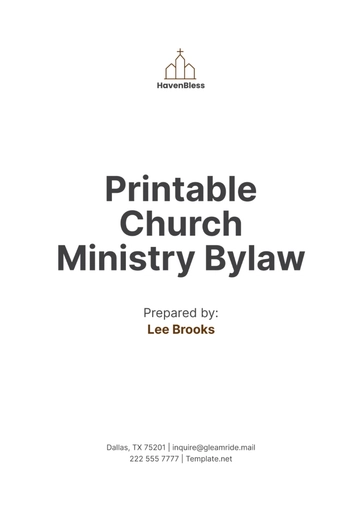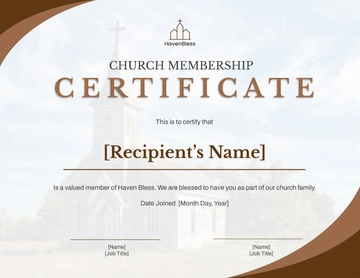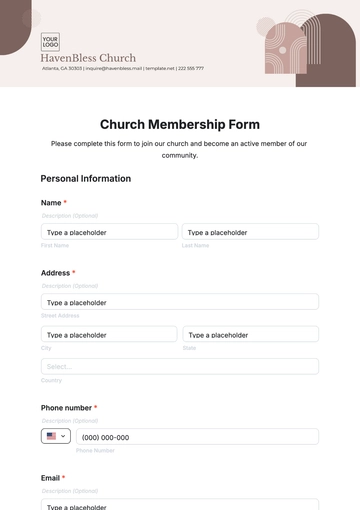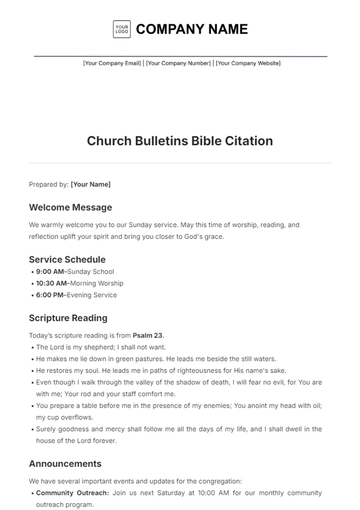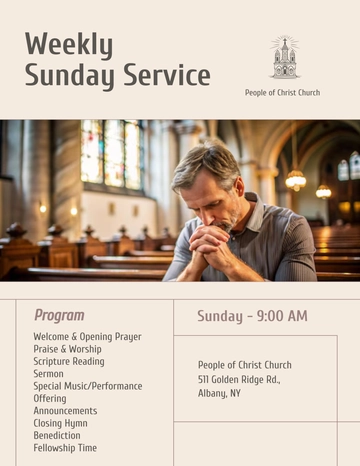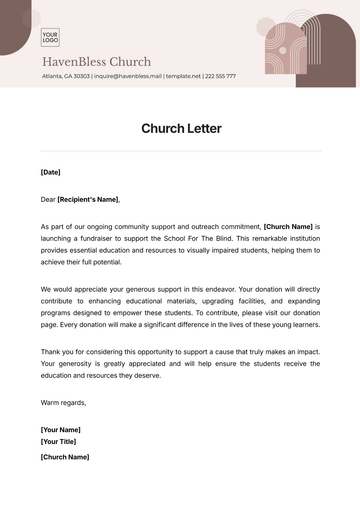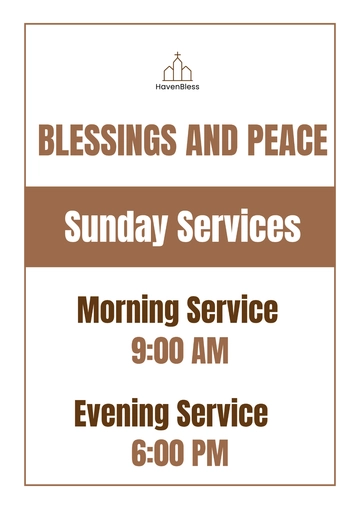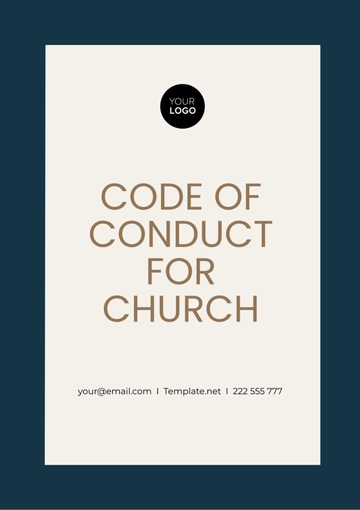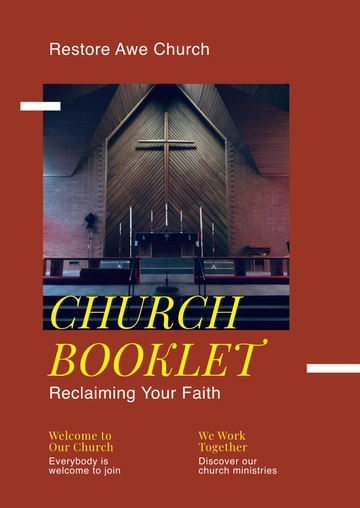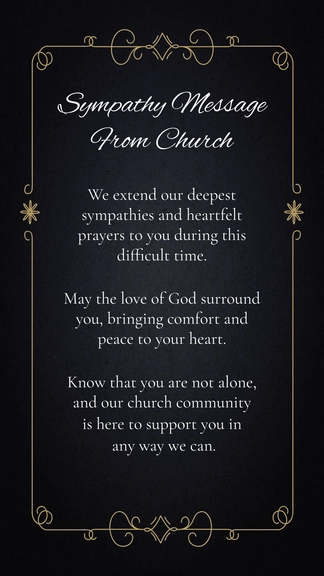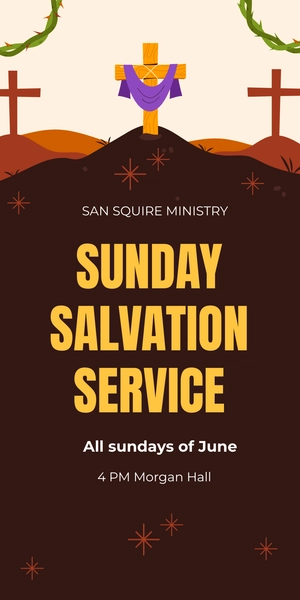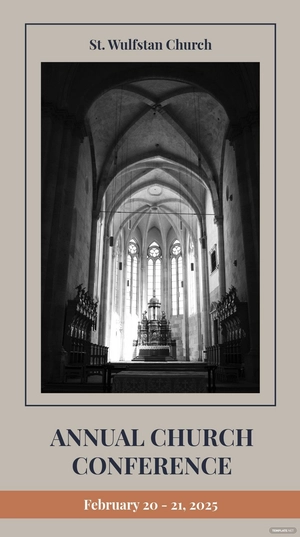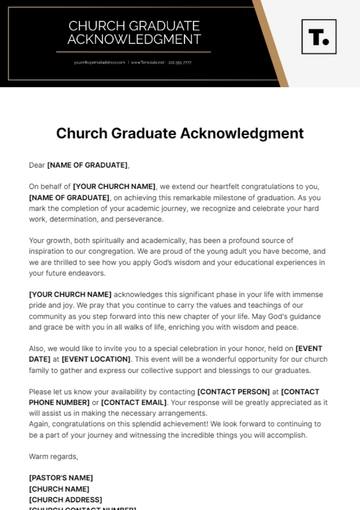Free Printable Church Ministry Bylaw
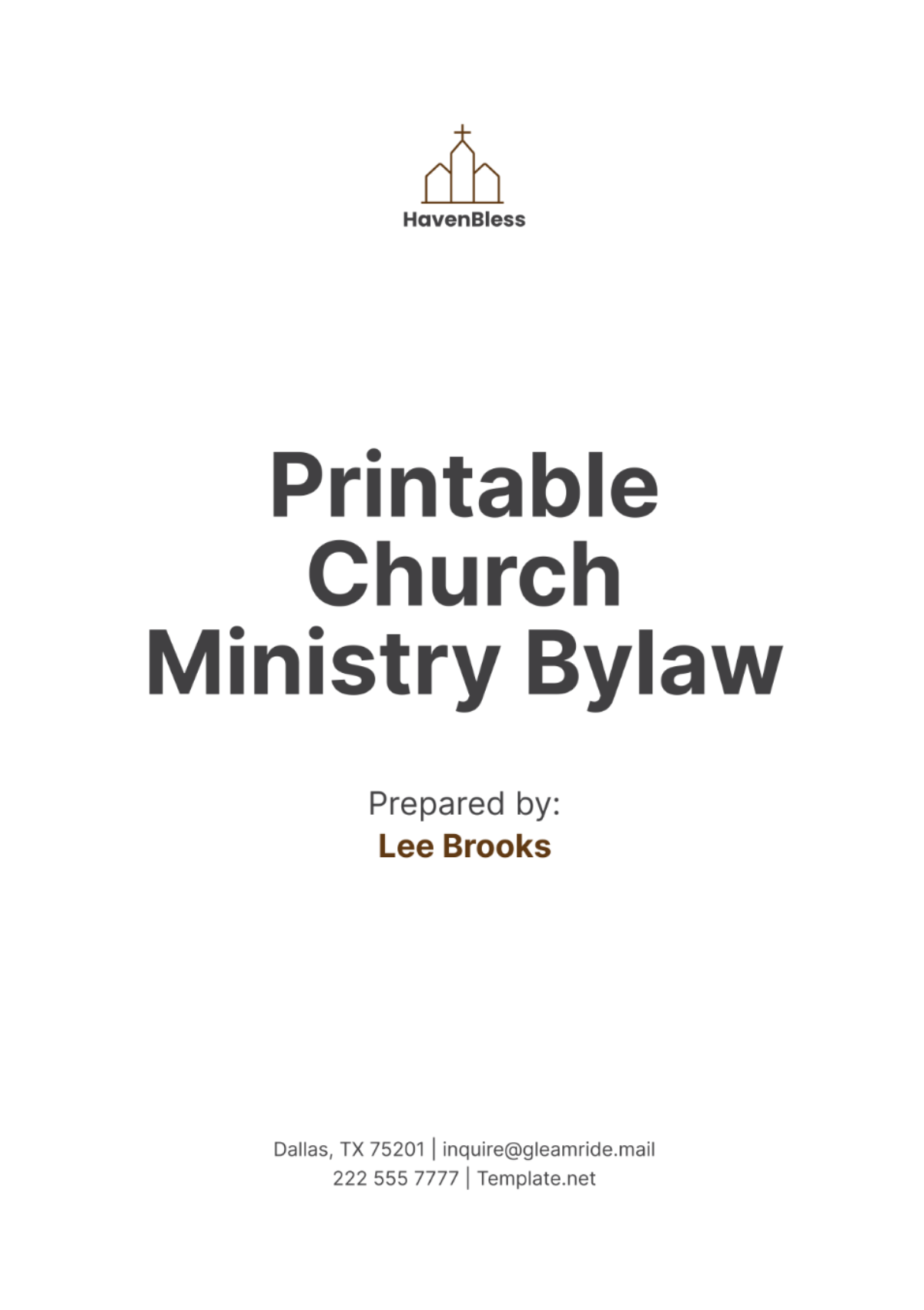
I. Introduction
A. Purpose of the Bylaw
These bylaws are designed to establish a clear and organized framework for the effective governance and operation of the [Ministry Name]. They provide guidelines for decision-making, leadership, and member participation to ensure the ministry’s activities align with the mission of [Your Company Name]. By adhering to these bylaws, the ministry aims to promote transparency, accountability, and consistency in all its endeavors.
B. Scope and Applicability
The bylaws apply to all individuals involved in [Ministry Name], including leaders, members, and volunteers. They govern the ministry’s operations, including meetings, financial management, and conflict resolution. All activities conducted under the auspices of the ministry must comply with these bylaws to maintain coherence and alignment with the church’s overarching goals.
C. Definitions and Terminology
“Community Outreach Ministry” refers to the outreach-focused department within Greenwood Church dedicated to addressing community needs through service projects, educational programs, and partnership initiatives.
“Leadership” includes all elected or appointed individuals responsible for overseeing and directing the ministry’s activities, including the Director, Assistant Directors, and Committee Chairs.
“Member” is defined as an individual who has completed the application process, demonstrated commitment to the ministry’s mission, and actively participates in outreach activities and events.
II. Ministry Mission and Objectives
A. Mission Statement
The mission of [Ministry Name] is to foster spiritual growth and community engagement through outreach programs. Our mission is driven by a commitment to service, compassion, and inclusivity, reflecting the core principles of [Your Company Name]. By executing our mission, we aim to support the church’s broader vision of strengthening the faith community.
B. Goals and Objectives
Community Outreach Initiatives
To expand our outreach programs by partnering with local organizations and hosting quarterly community service events.
To increase volunteer participation by 25% over the next year through targeted recruitment and engagement strategies.
To launch a new mentorship program that pairs ministry members with local youth, aiming for at least 50 mentor-mentee pairs by the end of the year.
Educational and Training Programs
To develop and implement a series of educational workshops on topics such as financial stewardship, personal development, and biblical studies, with at least one workshop held per month.
To offer training sessions for ministry leaders and volunteers, focusing on leadership skills, conflict resolution, and effective communication.
To establish an online resource library with access to educational materials, recorded sermons, and training videos, making these resources available to members and the broader community.
Fellowship and Spiritual Growth
To organize monthly fellowship events, including potlucks, prayer meetings, and small group discussions, to strengthen relationships among members.
To facilitate regular spiritual growth activities such as retreats, Bible studies, and meditation sessions, aimed at deepening members’ faith and understanding.
To implement a peer support system where members can connect with spiritual mentors for personal and spiritual guidance, with a goal of having at least 30 active mentor-mentee relationships.
C. Alignment with Church Vision
[Ministry Name] supports the vision of [Your Company Name] by enhancing community engagement or spiritual growth. All ministry activities are designed to complement the church’s overall mission and objectives. This alignment ensures that the ministry’s efforts are integrated into the broader goals of the church.
III. Leadership Structure
A. Ministry Leadership Roles
Director/Coordinator
The Director/Coordinator oversees the day-to-day operations of the ministry, provides strategic direction, and represents the ministry in church meetings and events. This role involves managing staff, coordinating activities, and ensuring that the ministry’s goals are met. The Director is also responsible for setting agendas and leading meetings.
Assistant Directors
Assistant Directors support the Director in managing specific projects or areas of the ministry, such as outreach programs or administrative tasks. They step in to fulfill the Director’s responsibilities in their absence and may lead subcommittees or working groups. Each Assistant Director is assigned particular duties based on their expertise and the needs of the ministry.
Committee Chairs
Committee Chairs are responsible for leading specific committees within the ministry, such as those focused on events, finances, or volunteer coordination. They report to the Director and work collaboratively to achieve committee goals. Committee Chairs ensure that their committees operate effectively and align with the ministry’s overall objectives.
B. Election/Appointments
Nomination Process
Candidates for leadership positions are nominated through a formal process, which includes submitting nominations to a nominating committee or leadership board. Members can nominate themselves or others, and nominations must be received by a specified deadline. The nominating committee reviews and validates all nominations.
Election Procedures
Elections for leadership positions are held annually during a designated meeting, where members cast their votes. The election process includes campaigning, candidate speeches, and a voting period. The candidates with the majority of votes are elected to their respective positions.
Terms of Office
Leadership positions are held for a term of one year, with the option for re-election or reappointment. Members of the ministry may serve multiple terms if re-elected or reappointed. The term limits ensure that leadership remains dynamic and responsive to the ministry’s evolving needs.
C. Responsibilities and Duties
General Duties
All leaders are expected to attend scheduled meetings, participate in planning and decision-making, and fulfill their specific roles as described in the bylaws. They must work collaboratively with other leaders and members to achieve the ministry’s goals. Leaders are also responsible for maintaining open communication and providing updates on their activities.
Specific Responsibilities
The Director/Coordinator is responsible for overall management, including setting priorities, delegating tasks, and overseeing implementation. Assistant Directors handle specific projects or operational areas, ensuring that activities are executed according to plan. Committee Chairs lead their committees, organize meetings, and coordinate efforts to achieve committee objectives.
IV. Membership
A. Eligibility Criteria
To be eligible for membership in [Ministry Name], individuals must be a regular attendee of [Your Company Name], participate in introductory meetings, and demonstrate a commitment to the ministry’s mission. Eligibility is determined based on attendance, participation, and/or endorsement by current members.
B. Application and Enrollment
Prospective members must complete an application form that includes personal information, reasons for joining, and a commitment to the ministry’s mission. Following the submission of the application, candidates are required to attend an orientation session to learn about the ministry’s objectives and operations. Enrollment is finalized upon approval by the leadership team or designated committee.
C. Rights and Privileges
Members have the right to vote in leadership elections, participate in all ministry activities, and access resources and support provided by the ministry. They are also entitled to attend meetings, contribute to discussions, and receive regular updates on ministry events and initiatives. Membership includes the privilege of being involved in planning and executing ministry projects.
D. Termination and Removal
Grounds for Removal
Membership may be terminated for reasons such as failure to adhere to the ministry’s bylaws, misconduct, or non-participation in ministry activities. The leadership team reviews cases of removal to ensure that all decisions are fair and justified. Serious offenses or repeated violations may result in termination.
Process for Termination
The process for removal includes a review of the member’s conduct, a meeting with the member to discuss concerns, and an opportunity for the member to respond. A decision regarding termination is made by the leadership team, with written notice provided to the member. The member may appeal the decision by submitting a formal request for reconsideration.
V. Meetings
A. Frequency of Meetings
The ministry will conduct regular meetings on a [monthly] basis to discuss ongoing activities, review progress, and plan future initiatives. Special meetings may be called as needed to address urgent matters or specific issues. The schedule for regular meetings will be set at the beginning of each year and communicated to all members.
B. Types of Meetings
Regular Meetings
Regular meetings are held to review the ministry’s progress, make decisions, and address routine business. These meetings are scheduled in advance and follow a structured agenda. Members are encouraged to actively participate and provide input on various topics.
Special Meetings
Special meetings may be convened for specific purposes such as emergency decisions, important events, or project planning. These meetings are called by the Director/Coordinator or as requested by a majority of the leadership team. Members will be given adequate notice and information about the agenda and objectives of special meetings.
C. Notice and Agenda
Notices for all meetings will be distributed at least [one week] in advance, providing details such as date, time, location, and agenda items. The agenda will include all topics to be discussed and any supporting materials or reports. Members may request additional items to be included on the agenda by notifying the Director/Coordinator prior to the meeting.
D. Quorum Requirements
A quorum for conducting official business at meetings consists of [00]% of active members. If a quorum is not met, the meeting may be rescheduled or postponed until the required number of members is present. Decisions made without a quorum are considered preliminary and subject to confirmation at a later meeting.
E. Voting Procedures
Voting on decisions and proposals will be conducted by [secret ballot]. Each member in attendance has one vote, and a majority vote is required for most decisions. In the event of a tie, the Director/Coordinator or presiding officer will cast the deciding vote.
VI. Financial Management
A. Budgeting
The ministry will prepare an annual budget outlining projected income, expenses, and funding needs. The budget will be reviewed and approved by the leadership team before the start of the fiscal year. Regular financial updates will be provided to ensure transparency and keep members informed of the ministry’s financial status.
B. Fundraising Activities
All fundraising activities must be planned and approved by the leadership team to ensure alignment with the ministry’s goals and church policies. Fundraising efforts include events, campaigns, and solicitation of donations. Proper accounting and reporting of all funds raised will be maintained.
C. Financial Reporting
The ministry treasurer is responsible for maintaining accurate financial records and providing regular reports to the leadership team. An annual financial report will be prepared and presented to the membership, detailing income, expenses, and overall financial health. Reports will be made available to all members for review.
D. Audits and Accountability
The ministry’s financial records will undergo an annual audit conducted by an independent auditor to ensure accuracy and compliance with financial practices. Findings from the audit will be reviewed by the leadership team, and necessary adjustments will be made. The results of the audit will be shared with the ministry members.
VII. Conflict Resolution
A. Conflict Resolution Process
Conflicts within the ministry will be addressed through a structured process that involves open communication and mediation. Initial attempts to resolve conflicts should be made between the parties involved, with the support of the leadership team if needed. If unresolved, the conflict will be escalated to a formal mediation process.
B. Grievance Procedures
Members who have grievances should submit a written complaint detailing the issue to the leadership team. The leadership team will review the grievance, meet with the parties involved, and work towards a resolution. The outcome of the grievance process will be communicated in writing to all relevant parties.
C. Mediation and Arbitration
For conflicts that cannot be resolved through mediation, arbitration may be sought with the involvement of an impartial third party. The ministry will appoint a mediator or arbitrator who is experienced in conflict resolution. The decision of the arbitrator will be final and binding on all parties involved.
VIII. Amendments to Bylaws
A. Proposal of Amendments
Amendments to the bylaws may be proposed by any member in good standing by submitting a written proposal to the leadership team. The proposal must include a detailed explanation of the amendment and its intended impact. The leadership team will review and decide whether to present the amendment to the membership.
B. Review and Approval Process
Proposed amendments will be reviewed by the leadership team and discussed at a general meeting. The membership will vote on the proposed amendments, requiring a two-thirds majority for approval. Once approved, the amendments will be incorporated into the bylaws and communicated to all members.
C. Documentation and Record-Keeping
Approved amendments will be documented in an updated version of the bylaws, which will be distributed to all members. The previous version of the bylaws will be archived for reference. Records of all amendments and related decisions will be maintained by the leadership team.
IX. Compliance and Legal Considerations
A. Adherence to Church Policies
The ministry will operate in accordance with the policies and guidelines established by [Your Company Name]. This includes adhering to ethical standards, operational procedures, and any other directives issued by the church leadership. Compliance ensures that the ministry’s activities are consistent with the church’s overall mission.
B. Compliance with Local and Federal Laws
All ministry activities must comply with relevant local, state, and federal laws, including those related to nonprofit organizations, taxation, and employment. The ministry will regularly review and update its practices to ensure legal compliance. Legal advice may be sought to address complex legal issues or changes in legislation.
C. Insurance and Liability
The ministry will maintain appropriate insurance coverage to protect against risks and liabilities associated with its activities. This includes general liability insurance, property insurance, and any other relevant coverage. The leadership team will review insurance needs annually and make adjustments as necessary.
X. Miscellaneous Provisions
A. Interpretation of Bylaws
The leadership team is responsible for interpreting the bylaws and providing guidance on their application. In cases where the bylaws are unclear or ambiguous, the leadership team will make a determination based on the intent of the bylaws and the ministry’s goals. Any interpretations made will be documented and communicated to the membership.
B. Severability Clause
If any provision of these bylaws is found to be invalid or unenforceable by a court of law, the remaining provisions shall continue to be in effect. The invalid provision will be revised or replaced to comply with applicable laws while preserving the intent of the original bylaw. The severability clause ensures that the bylaws remain functional and enforceable.
C. Effective Date
These bylaws will become effective on [Date], following approval by the membership and formal adoption. All previous bylaws and policies are hereby repealed as of the effective date. The effective date marks the beginning of the new governance structure and procedures outlined in these bylaws.
- 100% Customizable, free editor
- Access 1 Million+ Templates, photo’s & graphics
- Download or share as a template
- Click and replace photos, graphics, text, backgrounds
- Resize, crop, AI write & more
- Access advanced editor
Streamline your church’s operations with the Printable Church Ministry Bylaw Template from Template.net. This fully editable and customizable template allows you to tailor bylaws to fit your ministry’s unique needs. Easily modify sections using the AI Editor Tool, ensuring a professional and polished document that aligns with your church’s vision and goals.
